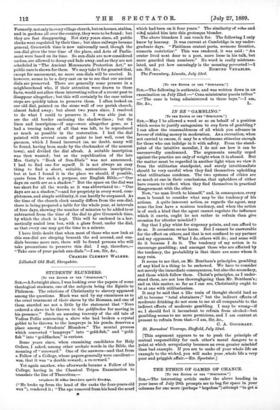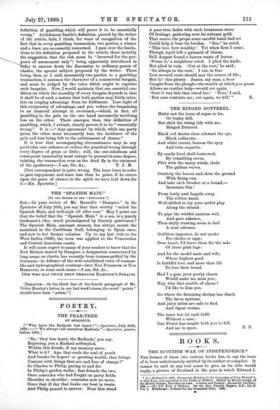THE ETHICS OF GAMES OF CHANCE.
[To THY EDITOR OF THE "SPECTATOR."]
Sin,—The interesting article under the above heading in your issue of July 20th prompts me to beg for space in your columns for one more (perhaps "hopeless ") attempt "to get a.
definition of gambling which will prove it to be essentially wrong." Archdeacon Smith's definition, quoted by the writer of the article, fails, I think, for want of recognition of the fact that in every gambling transaction, two parties, a winner and a loser, are necessarily concerned. I pass over the limita- tions to his definition proposed in the article, these (notably the suggestion that the risk must be "incurred for the pur- poses of amusement only ") being apparently introduced in 'rkr to narrow down the discussion to ordinary games of chaflere, the special subject proposed by the writer. There being, then, as I said, necessarily two parties to a gambling transaction, it assumes the character of a commercial bargain, and must be judged by the rules which ought to regulate such bargains. Now, I would maintain that one essential con- dition on which the morality of every bargain depends is, that it shall be of such a nature that both parties may fairly calcu- late on reaping advantage from its fulfilment. Lose sight of this reciprocity of advantage, and you reduce the bargaining to an immoral attempt to overreach,—which, in fact, all gambling is, the gain on the one hand necessarily involving loss on the other. There emerges, then, this definition of gambling, which, I submit, clearly proves it to be" essentially wrong." It is :—"Any agreement by which, while one party gains, the other must necessarily lose, the incidence of the gain and loss being left to the arbitrament of chance."
• It is true that accompanying circumstances may in any particular case enhance or reduce the practical wrong through every degree of great or little ; still, the one-sidedness and consequent immorality must always be present in some degree, tainting the transaction even as the dead fly in the ointment
of the apothecary.—I am, Sir, &c., T. J. M.
[Our correspondent is quite wrong. The loser loses in order to gain enjoyment, and loses less than he gains, if he enters upon the game of chance in the spirit we have laid down for it.—En. Spectator.]



































 Previous page
Previous page